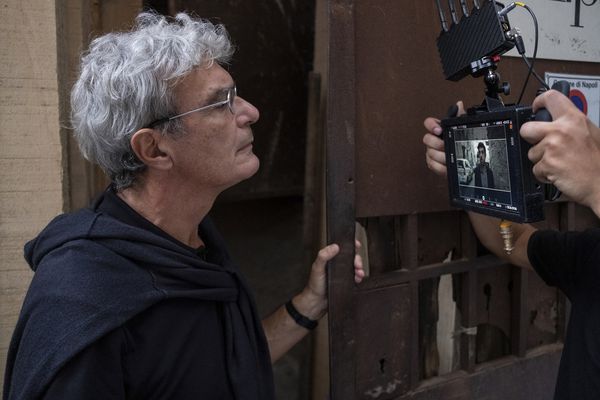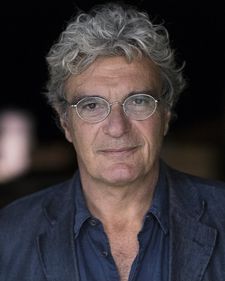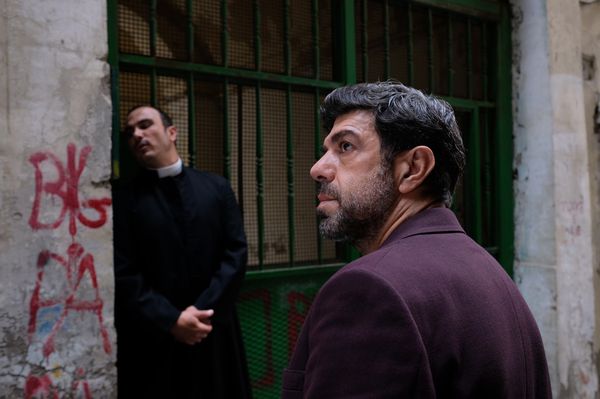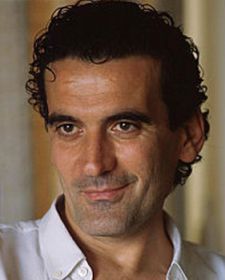 |
| In sharp focus: Mario Martone checks out Pierfrancesco Favino on the mini monitor during the filming of Nostalgia in Naples Photo: Film Italia |
Nostalgia was shot in the bustling Sanità area in the heart of the city which has a reputation for crime and poverty but also boasts stunning churches and baroque buildings.
It emerged as Italy’s contender in the race for the best foreign film Oscar but failed to make the final mix. Pairing the director and the material seemed like a perfect match.
Martone who’s also a stage director, was asked by his producer to adapt the novel. “Up to that moment I had never done a film based on a book that I didn’t choose myself,” he said. “The story it told immediately grabbed my attention.”
 |
| Mario Martone on Naples: 'It is a city that can devour you, and like Felice I needed to impose a certain distance' Photo: UniFrance |
Is there any similarity in Felice’s relationship with the city of his birth and Martone’s own feelings? “I live in Rome now. It is almost as if Naples had requested me to keep a certain distance. It is a city that can devour you, and like Felice I needed to impose a certain distance. It is a city of many contradictions - on the one hand it is very beautiful and on the other there is squalor. My roots are here but on the other hand as I don’t live there any more I can adopt a more external gaze,” he said.
“The novel chronicles the social side of the city where crime is never far away. Strangely enough this wasn’t the aspect that interested me. The social chronicle contains something deeper and more mysterious. Its secret is that it underscores the extent to which destiny plays a fundamental role in the existence of every human being. So although it’s set in a very specific part of the city the story itself has a universal aspect.”
 |
| Mario Martone on Pierfrancesco Favino as Felice Lasco in Nostalgia: 'He’s not a hero. He’s someone who feels the need to find himself by going back to his roots, at any cost.' Photo: Film Italia |
There are close connections between Nostalgia and Martone’s early work Troubling Love (L’amore molesto) which got him noticed some 27 years ago in competition at the Cannes Film Festival. That film, adapted from Elena Ferrante’s novel, also delved in to the dark side of the city. Nostalgia starts with Lasco arriving in the Via Foria (one of the city’s main streets) with a track by American singer-songwriter Steve Lacy playing in the background. Troubling Love began in the same setting with the same piece of music. Martone smiles: “It is almost as if the two films were speaking to each other at a distance of 27 years or so.”
Martone liked the idea of a central character whom he considers “so outside the box in terms of what you see in Italian cinema. He’s not a hero. He’s someone who feels the need to find himself by going back to his roots, at any cost.” The director who used locals alongside his professional cast, also discovered a part of the city he had never explored before.
“It’s an enclave that even Neapolitans don’t know well, far from the sea and quite dangerous, which was abandoned for many years. But I was drawn to the notion that I could make a film entirely in this quarter that became sort of like a chessboard or a labyrinth. And when I make a film I need to be constantly surprised, so the neighbourhood worked for me on that level too.” Lasco has a mission: to rekindle his relationship with is mother whom he had abandoned for almost four decades.
 |
| Massimo Troisi. Mario Martone says his documentary on the Italian icon was 'a labour of love' Photo: Film Italia |
Favino who recently had played the lead in Marco Bellocchio’s The Traitor, was up for the challenges, which involved learning Neapolitan dialect as well as Arabic. “He was right for the role because he is an actor who can carry his character. We immersed ourselves both physically and spiritually in the area in order to meet the locals and to unlock their mysteries. Pierfrancesco invested himself heavily in this - playing the game to the point where developed a physical rapport with the surroundings.”
Martone felt a similar strong connection to the subject of his next project - a documentary around Massimo Troisi, Someone Down There Loves Me which is premiering at the Berlin Film Festival. For many Troisi (an actor, cabaret performer, screenwriter and director) remains indelibly the simple postman who delivers mail to the Nobel Prize-wining poet Pablo Neruda in Michael Radford’s The Postman (Il Positino). He died of congenital heart failure at the age of 41 just the day after the film finished shooting in Rome. “I always thought he was an extraordinary filmmaker and he was held in much affection as an actor. Making it has been a labour of love, especially as he was a proud Neapolitan,” says Martone.
Nostalgia on release in UK and Ireland from 17 February; Portugal 23 February, Sweden 14 April.





















